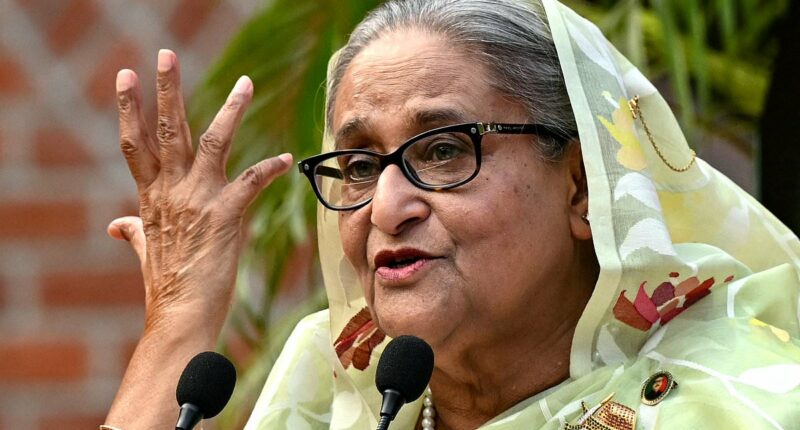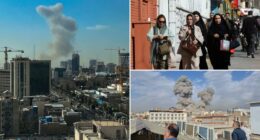Share this @internewscast.com
Bangladesh’s ex-Prime Minister, Sheikh Hasina, has been convicted of crimes against humanity and sentenced to death.
A special tribunal determined that she ordered a violent suppression of student-led protests last year, during which the United Nations estimates that up to 1,400 individuals were killed, mostly by security forces’ gunfire.
The 78-year-old Hasina, who is the aunt of Labour MP Tulip Siddiq, was tried in absentia as she currently resides in exile in India, having been ousted from power.
In response to the ruling, Hasina stated, “The verdicts against me were delivered by a rigged tribunal set up and overseen by an unelected government lacking any democratic legitimacy.”
She continued, “These decisions are biased and driven by political motives. The call for the death penalty blatantly reveals the extremist elements within the interim government aiming to eliminate Bangladesh’s last elected prime minister.”
A three-member panel of judges from the country’s international crimes tribunal found Hasina guilty of offenses including murder, extermination, torture, and other inhumane actions.
Reading the verdict to the court, Justice Golam Mortuza Mozumder said the ‘accused prime minister committed crimes against humanity by her order to use drones, helicopters and lethal weapons’.
Hasina had pleaded not guilty to the charges and alleged the tribunal was a ‘politically motivated charade’.

Bangladesh’s former Prime Minister Sheikh Hasina has been found guilty of crimes against humanity and sentenced to death

A man holds a poster in front of the court demanding the capital punishment ahead of the verdict on charges of crimes against humanity for a deadly crackdown on student-led protests in 2024 against the ousted Prime Minister Sheikh Hasina

Labour MP Tulip Siddiq (left) at the Kremlin in 2013 with her aunt, Sheikh Hasina
Hasina is the aunt of Siddiq, the Labour MP for Hampstead and Highgate, who served as economic secretary to the Treasury until her resignation in January.
Security was ramped up across Bangladesh on Monday morning due to fears of protest, as family members of those killed during the 2024 uprising broke down in tears in the Dhaka courtroom.
A death sentence was also handed to the former home minister, Asaduzzaman Khan, her co-accused in the trial, for crimes against humanity.
The court also sentenced ex-police chief Chowdhury Abdullah Al-Mamun to five years in prison. He was awarded leniency for his contribution to the trial, including ‘material evidence to the tribunal to arrive at the correct decision’.
Hasina, physically absent from the trial, remained defiant in an audio message recorded prior to the verdict.
‘Let them announce whatever verdict they want. It doesn’t matter to me. Allah gave me this life and only he can end it. I will still serve my people,’ she said.
As the sentences were announced, cheers and applause erupted both inside and outside the court, as a small group of people chanted for the guilty to be hanged.
Prosecutors had also demanded that she be given the death penalty.
‘Today’s verdict belongs to every victim of her rule,’ Maynul Karim, for the prosecution, told The Telegraph.
‘It is a victory for every civilian who was murdered or subjected to enforced disappearance for demanding their rights. For the first time, they have seen the justice they were denied for so long.
‘If justice matched the scale of her crimes, she would face punishment not once but 1.400 times over,’ he said. ‘One sentence alone cannot heal the wounds of the victims. They want every perpetrator, every commander, every official who carried out her orders held to account. Punishing Hasina alone is not enough.’
The Bangladeshi capital remained highly vigilant in the run-up to the historic decision, with paramilitaries cordoning off the tribunal area and police ordered to ‘shoot-on-sight’ if anyone was found setting fire to vehicles or using explosives.
At least 30 crude bomb explosions and 26 vehicles have been torched across the country over the past few days, according to reports.
The protest that led to Hasina’s downfall started as a student movement but escalated into a nationwide uprising, which has now been dubbed the ‘July revolution’, against her authoritarian rule.

Fires were lit in the streets of Dhaka as anti-quota protesters clashed with the police on July 18, 2024

A police officer is beaten by mob during a clash between anti-quota supporters, police and Awami League supporters at the Rampura area in Dhaka, Bangladesh, July 18, 2024

Police in riot gear detain a man who was refusing to leave the University of Dhaka premises

Anti-quota supporters clash with police and Awami League supporters at the Rampura area in Dhaka, Bangladesh, July 18, 2024
According to a United Nations report, up to 1,400 people may have been killed during the protests between July 15 and August 5, 2024, with thousands more injured – most of them by gunfire from security forces – in what was the worst violence in Bangladesh since its 1971 war of independence.
During the trial, prosecutors told the court they had uncovered evidence of Hasina’s direct command to use lethal force to suppress the student-led uprising.
The court said the attacks during the protests last year were ‘directed against the civilian population’, and ‘widespread and systematic’.
‘Therefore, in the atrocities of killing and gravely injuring protesters, as aforesaid, accused Prime Minister Sheikh Hasina committed crimes against humanity by her incitement order and also failure to take preventive and punitive measures under Charge 1,’ it said.
‘Accused Sheikh Hasina committed one count of crimes against humanity by her order to use drones, helicopters and lethal weapons under Charge number 2,’ the court added.
Her decade-and-a-half in power were viewed as a deadly reign of terror by many across Bangladesh as she was associated with corruption, torture and enforced disappearances, which were all documented by the United Nations as well as several human rights organisations.
Hasina’s lawyers have criticised the trial and last week appealed to the United Nations Special Rapporteur on extrajudicial, summary or arbitrary executions, citing ‘serious concerns’ over due process and fair trial rights.
Monday’s sentencing has raised fears of fresh political turmoil ahead of national elections expected in February.
















